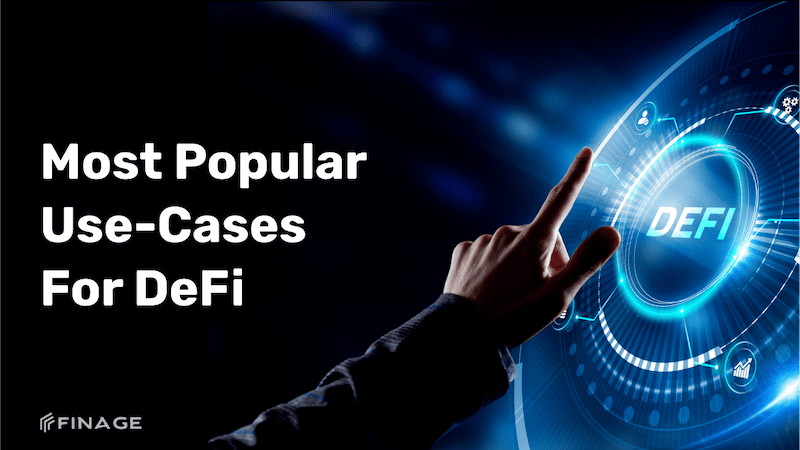Introduction
Today we will answer the question of what is DeFi, and then take a look at how it works and its uses. First of all, Decentralized Finance, or DeFi, are financial services built on blockchain technology. It seeks to empower the audience by creating an open, efficient, and all-inclusive financial system. DeFi platforms using smart contracts help everyone get involved in finance by providing permissionless financing. DeFi has also started to be included in any meaningful usage areas. These include decentralized exchanges, lending platforms, and prediction markets.
Decentralized finance (DeFi) is a form of blockchain-based financial tools and transactions that do not require intermediaries such as exchanges, banks, or brokers, but instead rely on the reliable execution of smart contracts. Smart contracts and blockchains are inherently immutable and deterministic; this means that oracles like Band Protocol play an imperative role in ensuring that correct inputs such as financial data are used in smart contract calculation for correct output.
With a total unlocked value of over $115 Billion, DeFi remains the industry vertical pushing blockchain technology towards mass adoption, and oracles have never played a bigger role in securing user funds from around the world.
Here are the most popular DeFi use cases:
- Cryptocurrencies
The prices of cryptocurrencies can jump as big as 10% per day, to prevent this volatility, stable cryptocurrencies based on nominal assets have emerged. For example, BiLira (TRYB) is a stable cryptocurrency indexed to the Turkish Lira and there is always 1 Turkish Lira behind 1 TRYB. Overall, stable cryptocurrencies provide a volatility-free cryptocurrency, making DeFi protocols and DAPPs more accessible.
- Decentralized Borrowing and Lending
No matter how good our financial situation is in our daily life, getting a loan is always a tiring process and is full of documents that we signed without reading the pages. Decentralized debt exchange has provided users with their own assets and cryptocurrencies as collateral, making debt exchange fit in our phones within minutes.
- Decentralized Payment
The biggest usage area of cryptocurrencies is payment exchange between two parties. With DeFi, payment methods have been moved to another dimension with different innovations and developments. With DeFi protocols, hourly, daily, weekly or monthly payments can be made transparently and securely thanks to smart contracts.
- Decentralized Exchanges
Although a decentralized system is considered when cryptocurrencies are spoken, it is the largest crypto exchange center in the world. Besides contradicting DeFi's origins, this centrality puts users' crypto assets at risk. However, thanks to non-intermediary DEXs such as Uniswap, users are in full control during the exchange of our crypto assets.
- Decentralized Funds
Fund management is the process of managing cash flow to maintain control of the return on your investments. There are two main types of fund management: active and passive fund management. Active fund management has a management team that makes investment decisions to generate returns above a certain index, such as the S&P 500. The passive fund does not have a management team, but is designed to mimic the performance of a given benchmark as closely as possible.
In DeFi protocols, some projects have begun to allow for decentralized active and passive fund management. The transparency of decentralized finance makes it easy for users to monitor how their funds are managed and understand the cost they will pay.
- Decentralized insurance
Insurance is a risk management strategy in which a person receives financial protection or reimbursement for losses from an insurance company in the event of an unfortunate event. It is common for individuals to purchase a car, home, health, and life insurance.
All cryptocurrencies locked in smart contracts are potentially vulnerable to smart contract vulnerabilities. While most projects have audited the code, we never know if smart contracts are truly secure and there is always the possibility of a hack that could result in a loss. The need to purchase decentralized insurance due to risks is a very important point, especially if there is a large number of funds in DeFi protocols.
We hope that this blog post will be beneficial for you. We will continue to create useful works in order to get inspired by everyone. We are sure that we will achieve splendid things altogether. Keep on following Finage for the best and more.
You can get your Real-Time and Historical Cryptocurrency(DeFi) Data with Finage free Crypto Data API key.
Build with us today!
Claim Your Free API Key Today
Access stock, forex and crypto market data with a free API key—no credit card required.

Stay Informed, Stay Ahead
Finage Blog: Data-Driven Insights & Ideas
Discover company news, announcements, updates, guides and more



